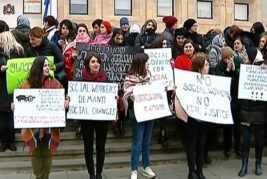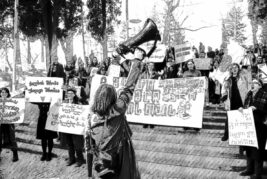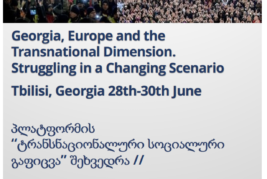organized by: Interventionistische Linke (Germany), Plan C (UK), Precarious Dis-connections (Italy)
The workshop aimed at connecting the struggles against precarity and the government of mobility and those against austerity in order for the former to get a wide political resonance, and for the latter to intervene in the everyday effects of austerity measures. It was organized by Interventionist Left (Germany), Plan C (UK) and Precarious (dis)connections (Italy), which gave first inputs to the discussions. The discussion was divided in two parts. The first one concerned problems and questions regarding the crisis of labour and the concrete struggles against everyday effects of austerity in everyday life. The second one was on the development of a common vision; pointing at intersections; reaching agreements on common tools, claims and discourses. At the center of the discussion was the questioning of the practice of solidarity as it is employed nowadays by social movements when dealing with labor struggles and disputes. One of the issues was about how to politicize the struggles so that they go beyond consolidating the identity of the activists. How to go on when the strike is over, without having to start all over again? This should be done in order to give to the «social» attribution of the strike a content that could be recognized as a possibility to build initiatives both on the local and on the transnational level. Questions like: how to widen the spectrum of the subjects involved in legal strikes? In front of legislations that are attacking the right to strike and of the fact that many unions are representing just a small part of the labor force (often those endowed with long-term contracts and unemployment and social benefits), how to offer to the precarious workforce the possibility of expressing their dissent and building their claims? How to build coalitions among different subjects that are involved in labor disputes (such as patients in nurses and doctors strikes, students in university protests and the like)?
The politicization of the strike does not just concern contracts, pay, working hours, etc. but also wider political messages, such as those against austerity measures, against the Europe of finance and the like. The politicization of the strike should help raise the leverage of the strikes, towards the construction of a wider movement that is not limited to groups of activists that are «specialized» in supporting labour struggles. One instance could be the attempt to stretch the legal framework of the struggles putting pressure on trade unions through a variety of initiatives, including the direct involvement of their members, to add new demands inside the collective agreements. Successful examples were the protest of the textile workers, shopping assistants and Blockupy activists at Zeil in Frankfurt in 2013; the migrants strike of the 1st of March 2010 in Italy (where the political message of the strike was against the connection of labor contract and residence permit, involving trade union delegates rather than trade union formal structures); the students direct actions and protests against workfare (forced labour imposition on jobseekers) in the UK.
In order to connect social and political struggles with workers’ struggles, and to politicize labour struggles, we discussed whether it can be useful to use common contents, claims, messages. Common European claims (minimum European wage, minimum European income, minimum European welfare, minimum unconditional visa for migrants) were discussed in this sense as tools to spread the word of the strike and organize and as a legal tool. Europe has been widely recognized as a minimum level of struggle, but not limited to its institutional nor geographic EU borders, which should be rather questioned. Europe is still central because it’s a powerful set of institutions to address. European as a minimum space of initiative is thus not enough, but a space to begin with. Limits and problems, as well as potentialities and points of strength, were thoroughly discussed. We agreed that common claims cannot substitute the need to continue the local everyday work of organizing workers (e.g. with precarity offices, as in Berlin). Some of us raised the problem of the difficulty of adopting common general claims in very local and particular struggles. Thus, in order to bind the local with the transnational level, we discussed about how to connect concrete demands with wider demands that go in the same direction.
How do we bring back home the result of this common discussion? How to enforce the framework of the transnational strike in the local settings? In order to be powerful and strong it has to be supported by our everyday practice. The possibility of sharing a common campaign on minimum wage of 15 euros was considered and possibly endorsed as a tool to spread the need of having European common discourses and practices. How does this campaign allow us to gain visibility? We discussed about making the workshop an ongoing space of discussion as well as the place where to decide on some concrete proposals to be endorsed locally. Communication should be our priority both on the local/union level (not necessarily with the structures but also with parts of it, working on the sides, with a strong discourse); in the networks we are part both on the national and the transnational level, such as Blockupy. Starting from the autonomy of the transnational social strike as a process, the effort should be to bring its discourses and practices in all those situations where they can resonate and which can give a concrete support to the construction of the transnational strike. Finally we agreed on the need of maintaining a continuous political communication. Inquiries were proposed as an instrument to understand the different conditions and to exchange information about strategies and practices, successes and failures to link austerity struggles and labour struggles.




